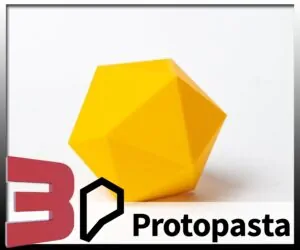Shop » HTPLA » Matte Fibre » HTPLA – Matte Fibre – Walnut Wood
HTPLA – Matte Fibre – Walnut Wood
$54.90
Premium Wood Finish! A bright alternative to Carbon or Glass Fibres, Yellow Matte Fibre HTPLA uses plant Fibres for texture and sheen. Great for both artistic and technical parts with no special hardware required!
0.5kg - MF Walnut
In stock
Premium Wood Finish
- A dark brown with elegant sheen and sophisticated texture
- Walnut is darker than Chestnut and less red than Mahogany
- Great for rigid, artistic prints with no special hardware required
- An Endless Pastabilities filament with inspiration from nature
- Designed & produced by Protoplant, makers of Protopasta
Features
- Easy to print
- Improve dimensional stability compared to standard HTPLA
- Performance similar to carbon fiber
- No special nozzles required
- No heated bed required
- Textured surface
- Can be shaved/carved/painted
- Usable on most PLA-compatible printers
Tech specifications
| Nominal diameter | 1.75 mm |
| Warp | very low |
| Flexibility | n.a. |
| Break resistance | medium |
| Printing temperature | 190-230 °C |
| Temperature resistance | 88-110 °C, 140 °C if treated |
Tips&Tricks
It prints like PLA on non-heated beds with tape. This Matte Fiber is not overly brittle, but is stiff and will break under excessive load. The material can be heat treated to retain more stiffness to higher temperatures. Dimensional stability is improved compared to HTPLA without fibers. The plant-based fibers improve adhesion of glues and coatings.
This material does absorb moisture and dry filament is recommend for best results. When saturated with moisture, this material oozes more readily. Lowering flow and/or temperatures can minimize oozing and improve detail, though higher temperatures are recommended for best mechanical properties. With higher temperatures, ooze artifacts can be removed post build.
Application
Architecture, sculpture, industrial and product design, engineering 3D prints.
How to do “Heat Treatment”
Bake your parts into a oven until you see a change from translucent to opaque. There is an obvious visual change indicating the improved performance! Good results were achieved in a lab oven at 110 °C for an hour or less. We recommend leaving the supports on your parts, placing them on a non-radiating surface (like glass, ceramic, or composite), and letting them cool in the oven to minimize distortion. Parts can be baked at a lower temperature (though must be above 60 °C for any change to occur) for a longer time with less risk of unwanted deformation.
TIP!
When you anneal a material like PLA materials it means that the plastic will continue to harden when exposed to low but consistent heat. Annealing will cause any 3d printed objects to temper, making it significantly less brittle and extremely tough. If done correctly, annealed parts will be resistant to warping, and maintain its original shape and structure.
However it may slightly shrink, so any critically-sized prints may be scaled up slightly by about 2 to 2.5% to make sure it will still fit any adjoining parts.
Due to all the different types of hot-end it’s extremely difficult to give a temperature advice. Please consider these tips, provided by the manufacturer, as a starting point to find the temperatures that work well in your setup. You may have to adjust the temperature settings slightly based on your type of printer.
For more about how to print HTPLA, consider the Protopasta getting started guide.
| Weight | 0.5 kg |
|---|---|
| Dimension | 1.75mm |
| Colour | MF Walnut |
| Brand |
Related products
- Quick ViewAdd to cart DetailsBuy Now
Proto-pasta Carbon Fibre Composite is a combination of milled carbon Fibres and high-performance PLA. Resulting 3D prints made with our Carbon Fibre HTPLA are demonstrably more rigid, providing excellent structural strength and layer adhesion with very low warpage.
- Quick ViewAdd to cart DetailsBuy Now
Copper-Filled Metal Composite HTPLA. Using real copper powder, Proto-pasta created a premium heat treatable metal PLA filament for 3D prints that finish just like real metal!
- Quick ViewAdd to cart DetailsBuy Now
A bright alternative to Carbon or Glass Fibres, Yellow Matte Fibre HTPLA uses plant Fibres for texture and sheen. Great for both artistic and technical parts with no special hardware required!
- Quick ViewAdd to cart DetailsBuy Now
Proto-pasta Carbon Fibre Composite is a combination of milled carbon Fibres and high-performance PLA. Resulting 3D prints made with our Carbon Fibre HTPLA are demonstrably more rigid, providing excellent structural strength and layer adhesion with very low warpage.






Reviews
There are no reviews yet.